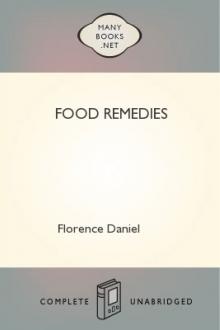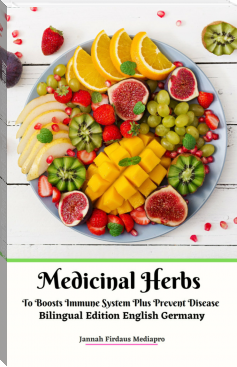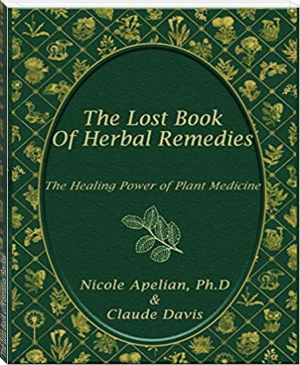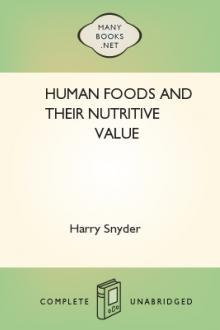Food Remedies by Florence Daniel (bts books to read .txt) 📕

- Author: Florence Daniel
- Performer: -
Book online «Food Remedies by Florence Daniel (bts books to read .txt) 📕». Author Florence Daniel
The Project Gutenberg EBook of Food Remedies, by Florence Daniel
This eBook is for the use of anyone anywhere at no cost and with
almost no restrictions whatsoever. You may copy it, give it away or
re-use it under the terms of the Project Gutenberg License included
with this eBook or online at www.gutenberg.org
Title: Food Remedies
Facts About Foods And Their Medicinal Uses
Author: Florence Daniel
Release Date: June 1, 2006 [EBook #18487]
Language: English
*** START OF THIS PROJECT GUTENBERG EBOOK FOOD REMEDIES ***
Produced by Feòrag NicBhrìde, Martin Pettit and the Online
Distributed Proofreading Team at http://www.pgdp.net
FOOD REMEDIES
HEALTHY LIFE BOOKLETS
No. 2. HEALTHY LIFE BOOKLETS
No. 1. The League against Health.
By Arnold Eiloart, B.Sc., Ph.D.
No. 2. Food Remedies.
By Florence Daniel.
Ready in September, 1908.
No. 3. Instead of Drugs.
By Arnold Eiloart, B.Sc., Ph.D.
No. 4. Healthy Life Cook Book.
By Florence Daniel.
Ready in December, 1908.
No. 5. Mind versus Medicine.
By Arnold Eiloart, B.Sc., Ph.D.
No. 6. Distilled Water.
By Florence Daniel.
FOOD REMEDIES FACTS ABOUT FOODS AND THEIR MEDICINAL USESBY FLORENCE DANIEL
LONDON
C. W. DANIEL
11 CURSITOR STREET, E.C.
1908 PREFACE
There is a sentence in the Talmud to the effect that the Kingdom of God is nigh when the teacher gives the name of the author of the information that he is passing on. With every desire to fulfil the rabbinical precept and acknowledge the sources of this booklet, I find myself in a quandary. If I make my acknowledgments duly I must begin with my grandmother and Culpeper's Herbal. Following upon those come the results of my own and friends' practical experience. After this I should, perhaps, give a list of the periodicals from whose pages I have culled much helpful information. But as space and memory preclude individual mention I must content myself with this general acknowledgment. Lastly, I desire to record my thanks to Dr. Fernie, whose Meals Medicinal, a large and exhaustive collection of facts about food, has afforded not the least valuable assistance.
F. D.
CONTENTSWhile there is life—and fruit—there is hope. When this truth is realised by the laity nine hundred and ninety-nine out of every thousand professors of the healing art will be obliged to abandon their profession and take to fruit-growing for a living.
Many people have heard vaguely of the "grape cure" for diseases arising from over-feeding, and the lemon cure for rheumatism, but for the most part these "cures" remain mere names. Nevertheless it is almost incredible to the uninitiated what may be accomplished by the abandonment for a time of every kind of food in favour of fruit. Of course, such a proceeding should not be entered upon in a careless or random fashion. Too sudden changes of habit are apt to be attended with disturbances that discourage the patient, and cause him to lose patience and abandon the treatment without giving it a fair trial. In countries where the "grape cure" is practised the patient starts by taking one pound of grapes each day, which quantity is gradually increased until he can consume six pounds. As the quantity of grapes is increased that of the ordinary food is decreased, until at last the patient lives on nothing but grapes.[1] I have not visited a "grape cure" centre in person, but I have read that it is not only persons suffering from the effects of over-feeding who find salvation in the "grape cure," but that consumptive patients thrive and even put on weight under it.
The Herald of Health stated, some few years back, that in the South of France where the "grape cure" is practised consumptive patients are fed on grapes alone, and become quite strong and well in a year or two. And I have myself known wonderful cures to follow on the adoption of a fruitarian dietary in cases of cancer, tumour, gout, eczema, all kinds of inflammatory complaints, and wounds that refused to heal.
H. Benjafield, M.B., writing in the Herald of Health, says: "Garrod, the great London authority on gout, advises his patients to take oranges, lemons, strawberries, grapes, apples, pears, etc. Tardieu, the great French authority, maintains that the salts of potash found so plentifully in fruits are the chief agents in purifying the blood from these rheumatic and gouty poisons.... Dr. Buzzard advises the scorbutic to take fruit morning, noon, and night. Fresh lemon juice in the form of lemonade is to be his ordinary drink; the existence of diarrhœa should be no reason for withholding it." The writer goes on to show that headache, indigestion, constipation, and all other complaints that result from the sluggish action of bowels and liver can never be cured by the use of artificial fruit salts and drugs.
Salts and acids as found in organised forms are quite different in their effects to the products of the laboratory, notwithstanding that the chemical composition may be shown to be the same. The chemist may be able to manufacture a "fruit juice," but he cannot, as yet, manufacture the actual fruit. The mysterious life force always evades him. Fruit is a vital food, it supplies the body with something over and above the mere elements that the chemist succeeds in isolating by analysis. The vegetable kingdom possesses the power of directly utilising minerals, and it is only in this "live" form that they are fit for the consumption of man. In the consumption of sodium chloride (common table salt), baking powders, and the whole army of mineral drugs and essences, we violate that decree of Nature which ordains that the animal kingdom shall feed upon the vegetable and the vegetable upon the mineral.
[1] This was the original treatment; now other food is added, although excellent results were obtained under the old régime.
Fruit and the Teeth.
I mention the above because one of the objections that I have heard cited against the free use of fruit is that "the acids act injuriously upon the teeth." Until I became a vegetarian I used to visit a dentist regularly every six months. I had done this for ten years, and nearly every tooth in my gums had its gold filling. The last time I visited the dentist I told him that I had become a vegetarian, and he replied that he rather thought my teeth would decay quicker in future on account of an increased consumption of vegetable acids. But from that day, now nearly six years ago, to the present time, I have never been near a dentist. My teeth seem to have taken a new lease of life. It is a fact that the acids in fruit and vegetables so far from injuring the teeth benefit them. Many of these acids are strongly antiseptic and actually destroy the germs that cause the teeth to decay. On the other hand, they do not attack the enamel of the teeth, while inorganic acids do. Nothing cleanses the teeth so effectually as to thoroughly chew a large and juicy apple.
Fruit is a Food.
Until quite recently the majority of English-speaking people have been accustomed to look upon fruit not as a food, but rather as a sweetmeat, to be eaten merely for pleasure, and therefore very sparingly. It has consequently been banished from its rightful place at the beginning of meals. But fruit is not a "goody," it is a food, and, moreover, a complete food. All vegetable foods (in their natural state) contain all the elements necessary to form a complete food. At a pinch human life might be supported on any one of them. I say "at a pinch" because if the nuts cereals and pulses were ruled out of the dietary it would, for most people, be deficient in fat and proteid (the flesh and muscle-forming element). Nevertheless, fruit alone will sustain life if taken in large quantities with small output of energy on the part of the person living upon it, as witness the "grape cure."[2] The percentage of proteid in grapes is particularly high for fruit.
Those people who desire to make a fruitarian dietary their daily régime cannot do better than take the advice of O. Hashnu Hara, an American writer. He says: "Every adult requires from twelve to sixteen ounces of dry food, free from water, daily. To supply this a quarter of a pound of shelled nuts and three-quarters of a pound of any dried fruit must be used. In addition to this, from two to three pounds of any fresh fruit in season goes to complete the day's allowance. These quantities should be weighed out ... and will sustain a full-grown man in perfect health and vitality. The quantity of ripe fresh fruit may be slightly increased in summer, with a corresponding decrease in the dried fruit."
[2] Recent years have witnessed a modification of the original cure. Other food is now included, but I have not heard that the results are better.
Objections to Fruit.
Some vegetarians object that it is possible to eat too much fruit, and recommend caution in the use of it to people of nervous temperament, or those who seem predisposed to skin ailments. It is true that the consumption of large quantities of fruit may appear to render the nervous person more irritable, and to increase the external manifestations of a skin disease. But in the latter event the fruit is merely assisting Nature to throw the disease out and off more quickly, while in the former case the real cause lies not in the fruit but in some nerve irritant, tea, for example, the effects of





Comments (0)